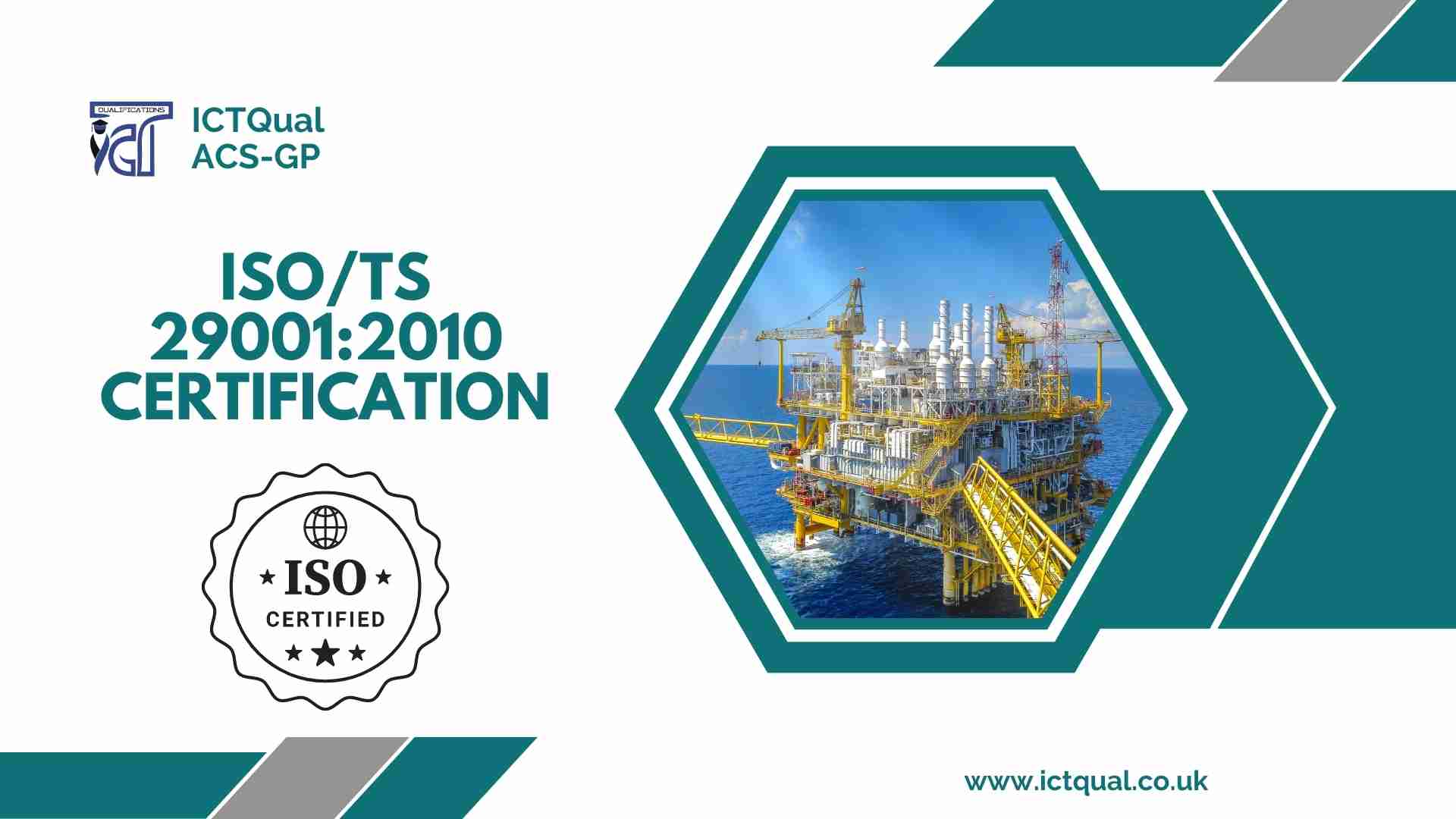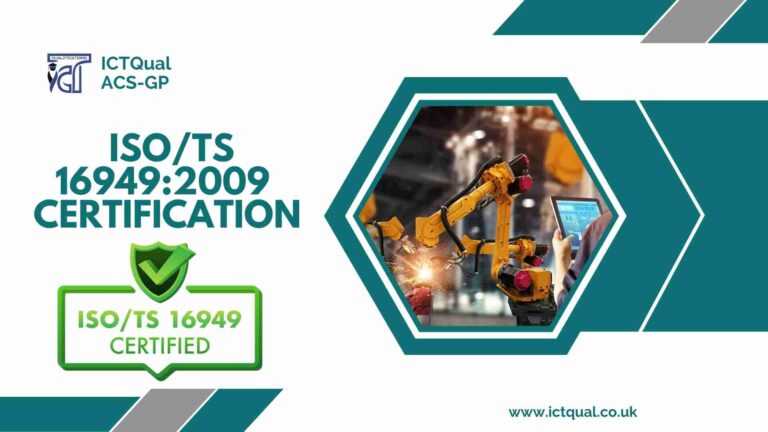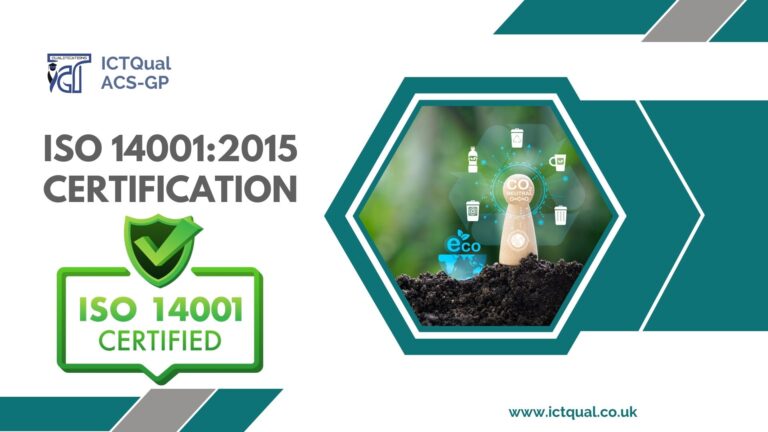Attention all Oil and Gas industry leaders! Are you looking to enhance your company’s reputation, credibility, and competitive advantage in the global marketplace? Look no further than ISO/TS 29001:2010 certification! This certification provides a framework for demonstrating your commitment to quality management, safety, and reliability in the industry. With ISO/TS 29001:2010 certification, you can improve your processes and procedures, increase customer satisfaction, reduce risks and incidents, and demonstrate compliance with international standards. Don’t miss out on this game-changing opportunity to take your company to the next level! Contact us today to learn more about ISO/TS 29001:2010 certification for the global Oil and Gas industry.
ICTQual is Exclusive partner of ACS-GP and providing services for company registration with ISO in following ISO Standards
ISO/TS 29001:2010 Certification
ISO/TS 29001:2010 is a certification standard that is specifically designed for companies operating in the oil and gas industry. The standard focuses on the requirements for establishing, implementing, maintaining, and improving an effective quality management system (QMS) for the industry. The certification provides a framework for organizations to demonstrate their commitment to quality management, safety, and reliability in the oil and gas industry.
Achieving ISO/TS 29001:2010 certification is not mandatory for companies operating in the oil and gas industry. However, many companies choose to pursue certification as a way to demonstrate their commitment to quality and safety, and to gain a competitive advantage in the market. This certification helps companies to improve their processes and procedures to ensure consistency and efficiency in operations, enhance their reputation and credibility with customers and stakeholders, increase customer satisfaction by providing high-quality products and services, reduce risks and incidents related to health, safety, and environmental issues, and enhance their ability to compete in the global marketplace by demonstrating compliance with international standards.
ISO/TS 29001:2010 Certification for Companies in the Oil and Gas Industry
In the oil and gas industry, maintaining the highest levels of quality, safety, and reliability is crucial to success. Companies in this industry face numerous challenges that can impact their operations, such as volatile market conditions, complex regulations, and environmental concerns.
To address these challenges, companies can pursue ISO/TS 29001:2010 certification. This certification is specifically designed for companies operating in the oil and gas industry and provides a framework for establishing, implementing, maintaining, and improving a robust quality management system.
ISO/TS 29001:2010 certification is a must-have for companies in the oil and gas industry for several reasons. First and foremost, it demonstrates a commitment to quality, safety, and reliability. By achieving this certification, companies can assure their customers, stakeholders, and regulators that they have established processes and procedures that meet international standards.
In addition, ISO/TS 29001:2010 certification can help companies improve their processes and procedures, enhance their reputation and credibility, and increase customer satisfaction. It can also help companies reduce risks and incidents related to health, safety, and environmental issues, as well as enhance their ability to compete in the global marketplace.
To achieve ISO/TS 29001:2010 certification, companies must undergo a rigorous assessment process that involves an external audit by an accredited certification body. This assessment evaluates the effectiveness of the company’s quality management system and its ability to meet the requirements of the standard.
ISO/TS 29001:2010 certification is a must-have for companies in the oil and gas industry. It provides a framework for establishing, implementing, maintaining, and improving a robust quality management system that can enhance quality, safety, and reliability in operations. By achieving this certification, companies can demonstrate their commitment to excellence and gain a competitive edge in the marketplace.
Benefits of ISO/TS 29001:2010 Certification for Oil and Gas Companies
The oil and gas industry is one of the most complex and challenging industries in the world. It involves working in harsh environments, handling hazardous materials, and managing complex processes. In such an industry, maintaining high-quality standards is crucial for the safety of employees, the environment, and the public. This is where ISO/TS 29001:2010 certification comes in.
ISO/TS 29001:2010 is a quality management system (QMS) standard designed specifically for the oil and gas industry. It provides a framework for companies to establish, implement, maintain, and improve their QMS to meet the unique challenges of the industry.
The benefits of ISO/TS 29001:2010 certification for oil and gas companies are numerous. Here are some of the key benefits:
Improved Safety
Safety is a top priority in the oil and gas industry. ISO/TS 29001:2010 certification helps companies establish and maintain a safety culture by ensuring that safety requirements are met, risks are identified and mitigated, and incidents are prevented or minimized.
Enhanced Credibility
ISO/TS 29001:2010 certification demonstrates a company’s commitment to quality management, safety, and reliability. This can enhance its credibility with customers, stakeholders, and regulatory bodies.
Increased Efficiency
Implementing ISO/TS 29001:2010 requirements can improve the efficiency and effectiveness of a company’s processes and procedures, resulting in reduced costs and increased productivity.
Improved Risk Management
The oil and gas industry involves various risks, such as operational, health and safety, environmental, and reputational risks. ISO/TS 29001:2010 certification helps companies identify and manage these risks, reducing the likelihood and impact of incidents.
Competitive Advantage
ISO/TS 29001:2010 certification can give oil and gas companies a competitive advantage by demonstrating their compliance with international standards and their commitment to quality, safety, and reliability.
In conclusion, ISO/TS 29001:2010 certification is an important investment for oil and gas companies. It helps them improve safety, enhance credibility, increase efficiency, improve risk management, and gain a competitive advantage. By pursuing certification, oil and gas companies can demonstrate their commitment to quality and safety, and achieve long-term success in the industry.
Enhancing Quality Management in the Oil and Gas Industry
ISO/TS 29001:2010 certification is a quality management standard specifically designed for companies operating in the oil and gas industry. This certification is a testament to a company’s commitment to delivering high-quality products and services while prioritizing safety and environmental responsibility.
Achieving ISO/TS 29001:2010 certification requires a company to establish and maintain an effective quality management system that meets the requirements of the standard. The certification process includes a rigorous assessment of a company’s quality management system, which includes a review of its policies, procedures, and processes. The assessment is conducted by an accredited certification body to ensure that the company’s quality management system is in compliance with the standard.
One of the main benefits of ISO/TS 29001:2010 certification is that it enhances quality management in the oil and gas industry. By implementing a quality management system that meets the requirements of the standard, companies can improve their processes, procedures, and overall efficiency. This, in turn, can lead to increased customer satisfaction and improved business performance.
ISO/TS 29001:2010 certification also helps oil and gas companies to ensure safety and environmental responsibility in their operations. The certification requirements include provisions for risk assessment, incident investigation, and emergency response planning, among other safety-related measures. By implementing these measures, companies can reduce the risk of incidents and accidents, protect their employees, and minimize the impact of their operations on the environment.
Another benefit of ISO/TS 29001:2010 certification is that it enhances the credibility of oil and gas companies. Certification demonstrates to customers, regulators, and other stakeholders that a company is committed to delivering high-quality products and services while prioritizing safety and environmental responsibility. This can help to increase customer confidence in a company’s products and services, improve stakeholder relationships, and enhance the company’s reputation in the industry.
In conclusion, ISO/TS 29001:2010 certification is an essential step for companies operating in the oil and gas industry that wish to enhance their quality management, ensure safety and environmental responsibility, and improve their credibility with customers and stakeholders. By achieving certification, companies can establish themselves as leaders in the industry and gain a competitive advantage in the global marketplace.
ISO/TS 29001:2010 Certification, a Game-Changer for Oil and Gas Companies
ISO/TS 29001:2010 certification is a game-changer for oil and gas companies because it provides a framework for establishing, implementing, maintaining, and improving a quality management system (QMS) that is specifically designed for the industry. This certification can help oil and gas companies in many ways.
First, ISO/TS 29001:2010 certification helps oil and gas companies to enhance their reputation and credibility. By achieving this certification, companies demonstrate that they are committed to providing high-quality products and services that meet or exceed industry standards. This can help to build trust with customers, investors, and other stakeholders, and can enhance the company’s image and brand.
Second, ISO/TS 29001:2010 certification can help oil and gas companies to improve their processes and procedures, leading to increased efficiency and productivity. By implementing a QMS that is tailored to the industry’s unique requirements, companies can streamline their operations and reduce waste, leading to cost savings and improved profitability.
Third, ISO/TS 29001:2010 certification can help oil and gas companies to reduce risks and incidents related to health, safety, and environmental issues. By implementing a QMS that prioritizes safety and environmental sustainability, companies can protect their employees, communities, and the environment, while also reducing the likelihood of accidents and incidents that can lead to costly legal and financial consequences.
Finally, ISO/TS 29001:2010 certification can help oil and gas companies to gain a competitive advantage in the marketplace. By demonstrating compliance with international standards, companies can differentiate themselves from competitors and position themselves as leaders in the industry. This can help to attract new customers and investors, and can also help to retain existing customers who prioritize quality and safety in their business partnerships.
In conclusion, ISO/TS 29001:2010 certification is a game-changer for oil and gas companies because it can help to enhance their reputation, improve their processes and procedures, reduce risks and incidents, and gain a competitive advantage in the marketplace. Companies that pursue this certification are making a smart investment in their future success and sustainability in the industry.
Achieving ISO/TS 29001:2010 Certification for Oil and Gas Companies
Achieving ISO/TS 29001:2010 certification is a significant milestone for oil and gas companies, as it demonstrates their commitment to quality management, safety, and reliability. However, the certification process can be rigorous and challenging, requiring companies to invest time, effort, and resources.
To achieve ISO/TS 29001:2010 certification, oil and gas companies must follow a structured approach that involves several key steps:
Conduct a Gap Analysis
The first step is to conduct a gap analysis to assess the current state of the company’s quality management system (QMS) against the ISO/TS 29001:2010 standard. This helps identify any gaps and areas that require improvement.
Develop an Implementation Plan
Once the gaps have been identified, a plan must be developed to address them. This involves defining objectives, setting targets, and establishing an implementation timeline.
Implement the QMS
The next step is to implement the QMS and ensure that all employees are trained and aware of their roles and responsibilities. This involves developing and documenting processes, procedures, and work instructions to ensure consistency and efficiency.
Conduct Internal Audits
Internal audits are conducted to evaluate the effectiveness of the QMS and to identify any areas that require improvement. This is an important step to ensure that the company is ready for the external audit.
Conduct External Audit
Once the QMS has been fully implemented and the internal audits have been completed, the company is ready for the external audit. An accredited certification body conducts the audit to evaluate the company’s compliance with the ISO/TS 29001:2010 standard.
Maintain and Improve the QMS
After achieving certification, the company must maintain and continuously improve the QMS to ensure ongoing compliance with the standard.
In conclusion, achieving ISO/TS 29001:2010 certification is a significant achievement for oil and gas companies. While the process can be challenging, it is essential for companies that want to demonstrate their commitment to quality management, safety, and reliability. By following a structured approach and investing in the process, companies can reap the benefits of ISO/TS 29001:2010 certification and gain a competitive advantage in the market.
Impact of ISO/TS 29001:2010 Certification on the Global Oil and Gas Industry
ISO/TS 29001:2010 certification has had a significant impact on the global oil and gas industry. This certification has helped to enhance the quality management practices of companies operating in this industry and has improved safety, reliability, and credibility.
One of the major impacts of ISO/TS 29001:2010 certification on the global oil and gas industry is the increased emphasis on safety. By adhering to the certification standards, companies are required to implement effective safety measures and reduce the risks associated with their operations. This has led to a significant reduction in accidents and incidents in the industry, which has helped to enhance the reputation of the industry as a whole.
In addition to safety, ISO/TS 29001:2010 certification has also helped to improve the quality of products and services offered by oil and gas companies. The certification requires companies to establish and maintain effective quality management systems, which helps to ensure that products and services meet the required standards of quality. This has led to increased customer satisfaction and has helped to improve the overall reputation of the industry.
ISO/TS 29001:2010 certification has also had an impact on the competitiveness of the oil and gas industry. Companies that achieve certification are able to demonstrate their commitment to quality and safety, which gives them a competitive advantage over companies that do not have certification. This has helped to improve the overall competitiveness of the industry and has led to increased investment in the sector.
Finally, ISO/TS 29001:2010 certification has had a positive impact on the environment. The certification requires companies to implement measures to reduce their environmental impact and to comply with relevant environmental regulations. This has helped to reduce the environmental impact of the oil and gas industry and has improved the reputation of the industry among stakeholders.
In conclusion, ISO/TS 29001:2010 certification has had a significant impact on the global oil and gas industry. It has helped to improve safety, reliability, and credibility, has led to increased customer satisfaction, and has improved the overall competitiveness of the industry. Companies that achieve certification are able to demonstrate their commitment to quality and safety, which has helped to improve the reputation of the industry as a whole.
Conclusion
In conclusion, ISO/TS 29001:2010 certification plays a crucial role in the global oil and gas industry. The certification helps companies to establish and maintain an effective quality management system that ensures consistency, efficiency, and reliability in operations. This, in turn, leads to improved customer satisfaction, enhanced reputation, and increased competitiveness in the marketplace.
ISO/TS 29001:2010 certification is not just a box-ticking exercise; it is a way for companies to demonstrate their commitment to quality, safety, and reliability. With the increasing demand for energy and the growing complexities of the oil and gas industry, ISO/TS 29001:2010 certification has become more important than ever.
By pursuing ISO/TS 29001:2010 certification, oil and gas companies can differentiate themselves from their competitors, gain a competitive edge, and improve their business operations. Moreover, the certification also contributes to the overall development of the oil and gas industry by promoting best practices, reducing risks and incidents related to health, safety, and environmental issues.
In today’s global market, ISO/TS 29001:2010 certification is an essential requirement for any company that wants to succeed in the oil and gas industry. It is a testament to the company’s commitment to quality, safety, and reliability, and an indicator of its ability to meet international standards.
Therefore, it is recommended that oil and gas companies pursue ISO/TS 29001:2010 certification to demonstrate their commitment to quality management, safety, and reliability. By doing so, companies can improve their reputation, enhance customer satisfaction, and gain a competitive edge in the marketplace.







